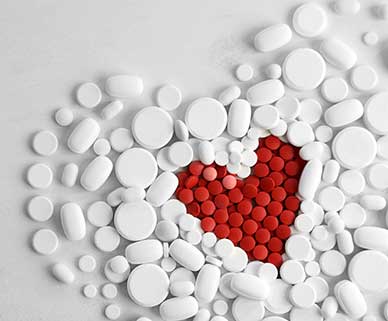Cardiovascular disease is one of the top causes of death in the Western world. In an age of convenience foods and high stress, many people die of heart attacks, strokes and other diseases of our heart and blood vessels. There is a constant stream of new pharmaceuticals intended to preserve our cardiovascular system, but these are limited in effectiveness and come with a scary list of side effects. What if there was a list of safe and natural ingredients for heart health? New studies on the effects of different micronutrients may offer this guidance.
Amino Acids for a Healthy Cardiovascular System
Americans get more protein than we need, but we are often lacking in some of the amino acids that are necessary for good heart health. Amino acids are more than building blocks of proteins, but also essential for certain biochemical and enzymatic reactions need to have optimal health. L-arginine is one of these essential amino acids. Recent studies have found that this amino acid can help to prevent coronary artery disease, thus preventing serious illnesses such as heart attacks. It also has been found to help with peripheral artery disease, angina and other cardiovascular diseases.
Taking in ample amounts of proline has been found to improve the health of these tissues. L-cysteine, often taken as the popular supplement N-acetyl cysteine, acts as an antioxidant, helping to prevent damage to tissues from toxins. Both amino acids are an important part of a heart-friendly diet.
Vitamins: Ingredients for Heart Health
 A large part of maintaining good heart health is simply eating a range of vitamins and minerals. B vitamins, folic acid, calcium and magnesium have all been found to have a positive impact on cardiovascular health. These are all recommended for daily consumption by dietitians and nutritionists. However, few people get enough of these nutrients. The Western diet is simply too processed and depleted to maintain good cardiovascular health. For people who struggle with diet temptations, a vitamin supplement can help to maintain a healthy heart and cardiovascular system naturally.
A large part of maintaining good heart health is simply eating a range of vitamins and minerals. B vitamins, folic acid, calcium and magnesium have all been found to have a positive impact on cardiovascular health. These are all recommended for daily consumption by dietitians and nutritionists. However, few people get enough of these nutrients. The Western diet is simply too processed and depleted to maintain good cardiovascular health. For people who struggle with diet temptations, a vitamin supplement can help to maintain a healthy heart and cardiovascular system naturally.
Why are these nutrients so important? Research shows that they act as cofactors in metabolism, allowing cells to function optimally. We also know that they act as antioxidants, preventing damage from oxidative stress. B vitamins are especially important because they help the body to maintain high levels of homocysteine in the blood, which helps to support good cardiovascular health. Our hearts and blood vessels simply cannot function as well without a full range of vitamins and minerals to support good health.
Grapeseed extract has a growing body of evidence suggesting that it is vital for a healthy heart and vessels. In fact, this compound is believed to be partially responsible for many of red wine’s purported health benefits. Grapeseed extract reduces inflammation, helps blood vessels to function optimally and even may lower cholesterol levels.
CoQ10 is also an important supplement. Also known as Coenzyme Q10 or ubiquinol, CoQ10 has been found in several studies to have a variety of beneficial cardiovascular effects. It lowers blood pressure and reduces plaque deposits on blood vessels. CoQ10 is necessary for good cell function and made by the human body. However, levels decrease as we age, which may be partly responsible for much of the tissue degeneration that often accompanies growing older.
Made from the popular fermented soybean dish natto, nattokinase has been used to lower the risk of blood clots after long airline flights. It also has a variety of other positive effects on the heart. Because people in the western world do not generally eat natto, the only food that contains this compound, taking a supplement is the only way to get the benefits of nattokinase.


